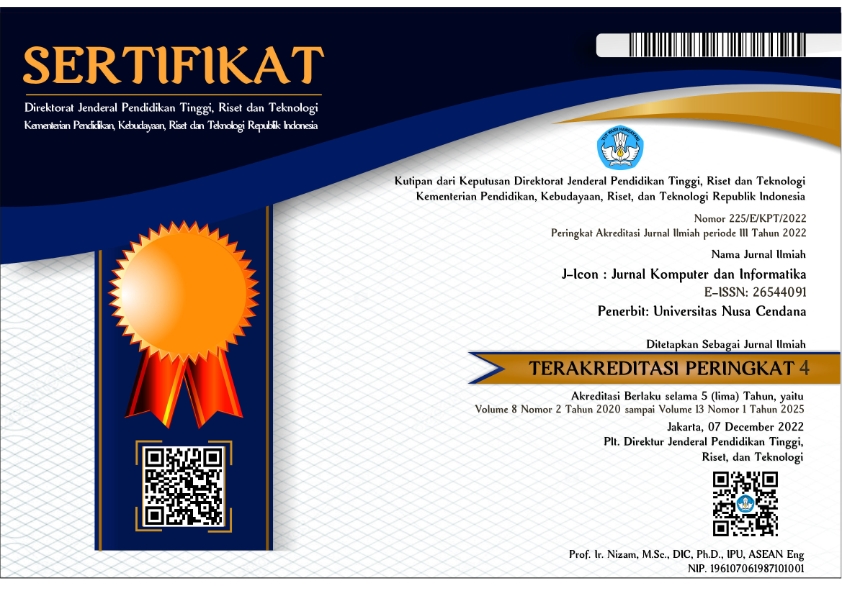IMPLEMENTATION OF APRIORI ALGORITHM FOR SALES DATA ANALYSIS (CASE STUDY: TOKO UD. SURYANI)
Abstract
Transaction data owned by a store or supermarket every day is sure to increase, but it is often found that the transaction data is just stored and notused. This is what happened at the UD. Suryani store, where the existing transaction data has not been used properly, even though the collection of transaction data has the potential for information that can be processed to produce useful new knowledge. This transaction data processing can be done with data mining techniques. One of the data-mining techniques that can be used is the association rule method. One of the data retrievalalgorithms with association rules is the Apriori algorithm. This algorithm serves to determine the association relationship of a combination of itemsand is suitable to be applied when there are several item relationships to be analyzed. The purpose of this research is to apply data mining to the transaction data for the last one year in the UD. Suryani store. The data mining processing process is carried out with the rapidminer application and from nine trials with different combinations of minimum support and minimum confidence values for 13,490 transaction data, the results obtained are that the item most purchased by consumers is the Masako Sapi Renteng 10g with a support value of 14,5% and for items that are often purchasedtogether, if you buy Eggs and Blue Band 200g, you will buy Kompas Kemasan 1kg, with the highest confidence value of 66.5%.
Downloads
References
Kusrini and E. T. Luthfi, Algoritma Data Mining. Yogyakarta: Andi offset, 2009.
N. Nurdin and D. Astika, “Penerapan Data Mining Untuk Menganalisis Penjualan Barang Dengan Menggunakan Metode Apriori Pada Supermarket Sejahtera Lhokseumawe,” TECHSI-J. Tek. Inform., vol. 7, no. 1, pp. 132–155, 2019.
P. N. Harahap and S. Sulindawaty, “Implementasi Data Mining Dalam Memprediksi Transaksi Penjualan Menggunakan Algoritma Apriori (Studi Kasus PT. Arma Anugerah Abadi Cabang Sei Rampah),” in Prosiding SiManTap: Seminar Nasional Matematika dan Terapan, 2019, vol. 1, pp. 235–243.
D. Rusdianto, Sutiyono, and L. Zaelani, “IMPLEMENTASI DATA MINING MENGGUNAKAN ALGORITMA APRIORI UNTUK MENGETAHUI POLA PEMINJAMAN BUKU DI PERPUSTAKAAN UNIVERSITAS BALE BANDUNG,” J. Sist. Inf. J-SIKA, vol. 02, no. 02, pp. 1–10, Dec. 2020.
D. Nofriansyah, Konsep Data Mining vs Sistem Pendukung Keputusan, 1st ed. DEEPUBLISH, 2014.
A. Ulumuddin and S. Juanita, “Implementasi Data Mining Dengan Metode Association Rule Pada Aplikasi Business Analytic Data Penjualan Menggunakan Algoritma Apriori,” SKANIKA, vol. 1, no. 3, pp. 1212–1218, 2018.
E. S. Sihombing, A. S. Honggowibowo, and D. Nugraheny, “Implementasi Data Mining Menggunakan Metode Apriori Pada Transaksi Penjualan Barang (Studi Kasus Di Chorus Minimarket),” Compiler, vol. 1, no. 1, 2012.
A. Salam and Moh. Sholik, “Implementasi Algoritma Apriori untuk Mencari Asosiasi Barang yang dijual di E-commerce OrderMas,” Techno.Com, vol. 17, no. 2, pp. 158–170, May 2018, doi: 10.33633/tc.v17i2.1656.
P. M. Hasugian, “Pengujian Algoritma Apriori Dengan Aplikasi Weka Dalam Pembentukan Asosiation Rule,” J. Mantik Penusa, vol. 1, no. 2, 2017.
R. T. Vulandari, Data Mining: Teori dan Aplikasi Rapiminer, 1st ed. Yogyakarta: Penerbit Gava Media, 2017.
Z. Tang and J. Wei, “Investigation and Application of Improved Association Rules Mining in Rapidminer.,” Int. J. Simulation–Systems Sci. Technol., vol. 17, no. 29, 2016.
S. Aisyah and N. Normah, “Penerapan Algoritma Apriori Terhadap Data Penjualan Di Swalayan Koperasi Bappenas Jakarta Pusat,” Paradig. - J. Komput. Dan Inform., vol. 21, no. 2, pp. 235–242, Sep. 2019, doi: 10.31294/p.v21i2.6205.
Copyright (c) 2021 J-Icon : Jurnal Komputer dan Informatika

This work is licensed under a Creative Commons Attribution 4.0 International License.
The author submitting the manuscript must understand and agree that if accepted for publication, authors retain copyright and grant the journal right of first publication with the work simultaneously licensed under a Creative Commons Attribution (CC-BY) 4.0 License that allows others to share the work with an acknowledgment of the work’s authorship and initial publication in this journal.
 Ahmad Adri(1)
Ahmad Adri(1)




